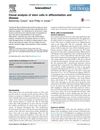 44 citations,
September 2014 in “Cell Death & Differentiation”
44 citations,
September 2014 in “Cell Death & Differentiation” Tumor suppressors help control inflammation in cancer and restoring their function could lead to new treatments.

Researchers found a genetic link for hereditary hair loss but need more analysis to identify the exact gene.
 87 citations,
July 2012 in “Expert Review of Clinical Immunology”
87 citations,
July 2012 in “Expert Review of Clinical Immunology” Pregnancy can increase lupus activity, but careful planning and treatment can improve outcomes.
 29 citations,
September 2012 in “Dermatologic Clinics”
29 citations,
September 2012 in “Dermatologic Clinics” Hair disorders are caused by a complex mix of biology, genetics, hormones, and environmental factors, affecting hair growth and leading to conditions like alopecia.
 19 citations,
December 2015 in “European Journal of Human Genetics”
19 citations,
December 2015 in “European Journal of Human Genetics” A rare ITGB6 gene variant causes intellectual disability, hair loss, and dental issues.
 16 citations,
February 2018 in “BMC Genomics”
16 citations,
February 2018 in “BMC Genomics” Certain genetic markers linked to reproductive potential were identified by their impact on a protein's ability to bind to genes.
 16 citations,
December 2006 in “Expert Review of Dermatology”
16 citations,
December 2006 in “Expert Review of Dermatology” Hair follicles are essential for skin health, aiding in hair growth, wound healing, and immune function.
 4 citations,
January 2017 in “Journal of pediatric endocrinology & metabolism/Journal of pediatric endocrinology and metabolism”
4 citations,
January 2017 in “Journal of pediatric endocrinology & metabolism/Journal of pediatric endocrinology and metabolism” Two different mutations in the vitamin D receptor gene cause different symptoms and responses to treatment in Lebanese patients with hereditary rickets.
 70 citations,
October 2020 in “The journal of allergy and clinical immunology/Journal of allergy and clinical immunology/The journal of allergy and clinical immunology”
70 citations,
October 2020 in “The journal of allergy and clinical immunology/Journal of allergy and clinical immunology/The journal of allergy and clinical immunology” Janus kinase inhibitors are promising drugs for treating autoimmune and inflammatory diseases.
 120 citations,
February 2009 in “Apoptosis”
120 citations,
February 2009 in “Apoptosis” Understanding how cells die in the skin is important for treating skin diseases and preventing hair loss.
 81 citations,
April 2009 in “Journal of Investigative Dermatology”
81 citations,
April 2009 in “Journal of Investigative Dermatology” Hair shedding is an active process that could be targeted to treat hair loss.
 25 citations,
May 2020 in “EMBO reports”
25 citations,
May 2020 in “EMBO reports” Calcium is important for stem cell function and maintenance, especially in blood and skin cells.
 January 2009 in “Springer eBooks”
January 2009 in “Springer eBooks” The document concludes that managing skin conditions during pregnancy is important and requires specialized care.
 January 2024 in “bioRxiv (Cold Spring Harbor Laboratory)”
January 2024 in “bioRxiv (Cold Spring Harbor Laboratory)” A specific enzyme is essential for proper hair follicle stem cell development and healthy skin.
 2 citations,
January 2022 in “Stem cell biology and regenerative medicine”
2 citations,
January 2022 in “Stem cell biology and regenerative medicine” Extracellular vesicles, including exosomes from certain cells, can stimulate hair growth.
 June 2018 in “Journal of Dermatological Science”
June 2018 in “Journal of Dermatological Science” UV radiation may cause DNA changes in skin, certain UVB therapy helps psoriasis, a new gene mutation is linked to mild piebaldism, different immune cells affect psoriasis, a drug promotes hair growth, and some cancer drugs could treat skin barrier issues.
 7 citations,
May 2005 in “Experimental Dermatology”
7 citations,
May 2005 in “Experimental Dermatology” Two mouse mutations cause similar hair loss despite different skin changes.
 19 citations,
May 2006 in “Clinical and Experimental Dermatology”
19 citations,
May 2006 in “Clinical and Experimental Dermatology” Researchers found a new mutation causing total hair loss from birth.
 11 citations,
September 2012 in “The journal of investigative dermatology/Journal of investigative dermatology”
11 citations,
September 2012 in “The journal of investigative dermatology/Journal of investigative dermatology” A mutation in the KRT71 gene causes a hair disorder by disrupting hair follicle structure and texture.
 9 citations,
February 2018 in “The Journal of Dermatology”
9 citations,
February 2018 in “The Journal of Dermatology” A new mutation in the LIPH gene was found to cause a rare hair disorder in a Japanese boy.
 6 citations,
January 2013 in “The Journal of Dermatology”
6 citations,
January 2013 in “The Journal of Dermatology” Researchers found a new genetic mutation causing a rare hair loss condition in the first Japanese child studied.
 March 2024 in “Frontiers in endocrinology”
March 2024 in “Frontiers in endocrinology” A new MTX2 gene mutation caused a severe genetic disorder in a young Chinese girl.
 7 citations,
January 2019 in “Australasian Journal of Dermatology”
7 citations,
January 2019 in “Australasian Journal of Dermatology” A genetic marker linked to a type of hair loss was found in most patients studied.
 86 citations,
October 2005 in “Experimental Dermatology”
86 citations,
October 2005 in “Experimental Dermatology” The Foxn1 gene mutation causes hairlessness and immune system issues, and understanding it could lead to hair growth disorder treatments.
22 citations,
January 2009 in “Advances in experimental medicine and biology” FOXN1 mutations cause severe immunodeficiency, hair loss, nail issues, and thymus defects.
 June 2023 in “British journal of dermatology/British journal of dermatology, Supplement”
June 2023 in “British journal of dermatology/British journal of dermatology, Supplement” A child with skin and tooth symptoms was found to have a genetic mutation causing cardiocutaneous syndrome, leading to heart problems.
 12 citations,
July 2016 in “British journal of dermatology/British journal of dermatology, Supplement”
12 citations,
July 2016 in “British journal of dermatology/British journal of dermatology, Supplement” Different hair fiber development might explain why hair loss severity varies in patients with a specific genetic mutation, and treatments that thicken hair could help.
 11 citations,
July 2016 in “Current Opinion in Cell Biology”
11 citations,
July 2016 in “Current Opinion in Cell Biology” New techniques have enhanced our understanding of how stem cells function and the role of mutations in aging tissues, which may influence future cancer therapies.
 11 citations,
March 2014 in “Journal of Investigative Dermatology”
11 citations,
March 2014 in “Journal of Investigative Dermatology” Genetic mutation and carcinogen treatment are both needed for skin cancer to develop in these specific mice.
 10 citations,
March 2015 in “Journal of dermatology”
10 citations,
March 2015 in “Journal of dermatology” The boy's severe skin disorder is caused by two new mutations in his TGM1 gene.





























